How Poland's business community is helping Ukrainians
- Published
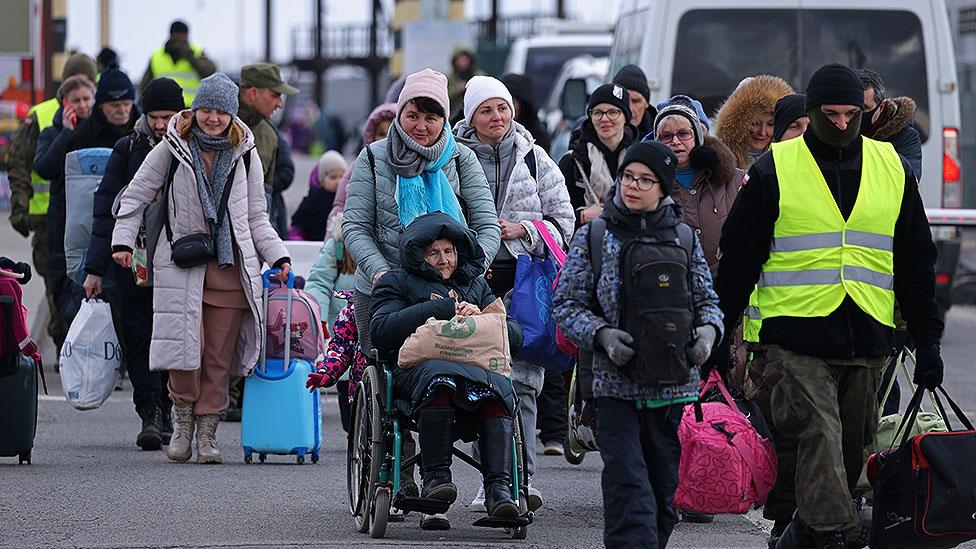
Refugees crossing over the border from Ukraine in to Korczowa in Poland on foot
Mariana Zlahodniuk spent days trying to persuade her mother, Olena, to get out of Ukraine.
"She wouldn't come, was adamant in fact," says Mariana, a 27-year-old marketing and business adviser from Ukraine, based in the Polish capital since 2012.
The pair's hometown of Zhmerinka, in central-southern Ukraine, is a strategic railway point and the frontline of the Russian invasion is edging closer.
Mariana's phone calls became more desperate, until, finally, Olena decided to make the hazardous journey to cross the border to safety in Poland.
Olena's mother, Mariana's 73-year-old grandmother, meanwhile, is left in their house in the small town. "She calls me every day and tells me to come home and tend to the garden," Olena adds.
Mariana eventually picked up her mum on the Polish side of the border on 26 February after a complicated journey - half of it on a slow train to Lviv with the lights turned off - to avoid attracting attention from the Russian military forces.
"I will go home as soon as I can and will do what I can to help, for example cooking for the soldiers," Olena says, when we meet in a cafe in Warsaw. "I will have to hide her passport," Mariana laughs.
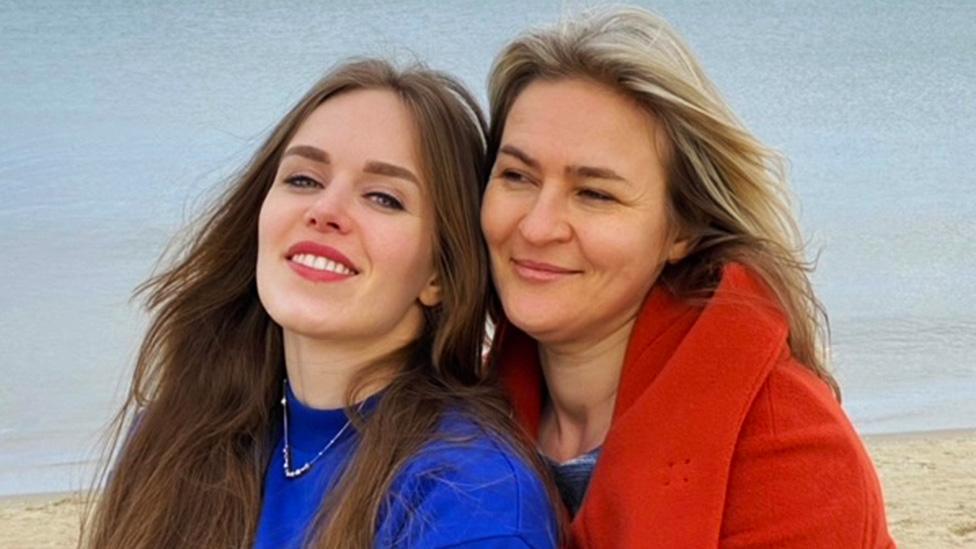
Mariana and Olena Zlahodniuk
Support at the border
When she arrived to collect her mother, Mariana says she was immediately struck by the lack of food and help available for the stream of refugees crossing at the border town of Korczowa and decided to act.
After phoning round her friends in the marketing and business community, she was quickly overwhelmed by offers of help.
She joined forces with an Afghan refugee-turned-restaurant owner, Harry Parwani, a friend from Krakow. His catering company, Vegan Ramen AF, has stepped in with its portable kitchen to help provide free food for up to 8,000 people a day at the border.
A Swiss investor then also funded more than €10,000 ($11,000; £8,398) of food shopping, and Mariana spent about 10,000 zlotys ($2,357; £1,765) of her own money supporting the work before charity organisations stepped in.
Mariana now employs 20 people as cooks and helpers, providing transportation and running a hotel. Shifts rotate every three to four days as the work is gruelling and some refuse to be paid, she says.
"Bakers sell me bread below market prices, firms bring in the food for free, companies offer free transportation and drivers. It's an extraordinary effort."
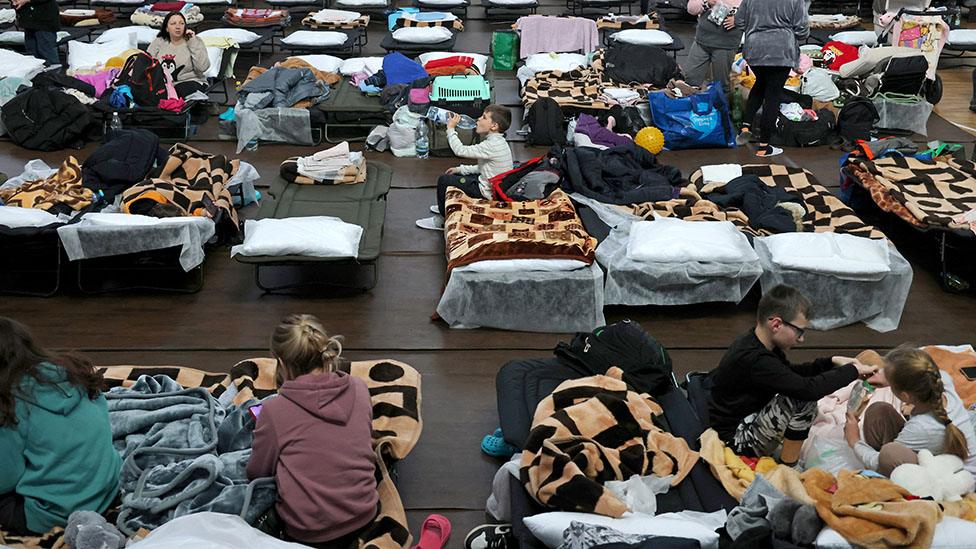
A new Ukrainian population could end up filling some of Poland's labour market gaps
'We want to provide support at all stages'
Polish businesses have mobilised quickly to help refugees. Two million have already arrived here.
"We will help as long as it will be required," says Krzysztof Inglot, founder of Poland's largest recruitment firm, Personnel Service.
"We know that refugees at different stages of their stay in Poland will need different support. At the beginning, it is mostly transport, accommodation, and psychological support. The next stage is settling down, finding work and integration with Polish society. We want to provide support at all these stages," he says.
National railway company PKP Intercity is offering free travel for refugees, while Maciej Panek, chief executive of vehicle hire firm Panek has donated 1,000 rental cars to transport people away from the border.
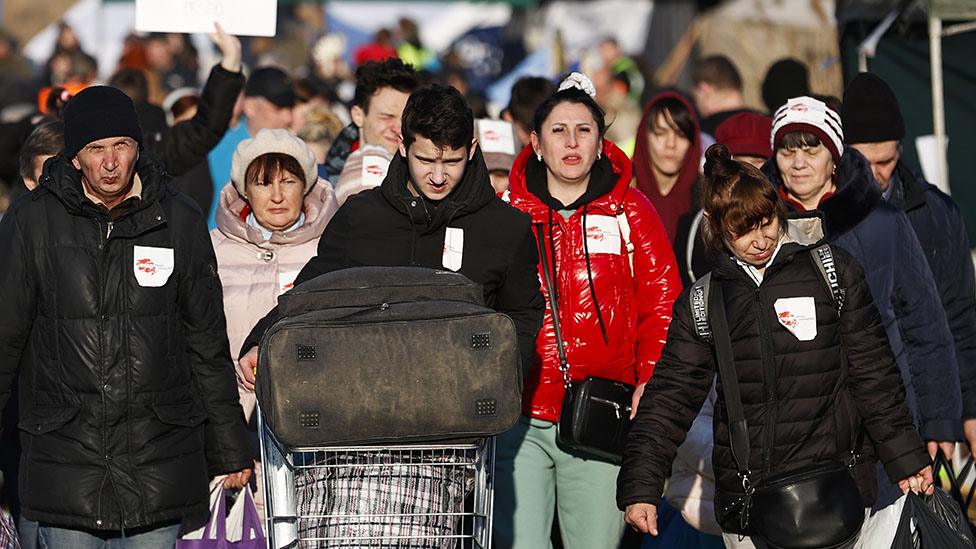
Many Ukrainian refugees arrive carrying just a couple of bags
Transport firm FlixBus, meanwhile, has provided refugees with free buses on routes from the border. The company also joined UA Talents - a jobs platform launched by two Berlin-based Ukrainian entrepreneurs that will help refugees find jobs.
Meanwhile, Poland's largest private healthcare company, Lux Med, has offered urgent free medical assistance to refugees. And mobile phone operators Play, Orange, Plus and T-Mobile are reducing the costs of telephone calls to the main Ukrainian operators, Kyivstar, Vodafone and Lifecell.
Helping the refugees sort out their finances will also become an important part of support - banks in Poland have already removed fees for money transfers to Ukraine and commissions for cash deposits and ATM withdrawals.
Mr Inglot is optimistic, he says his recruitment company data suggests the labour market in Poland could absorb 500,000 employees within the next six months and another 200,000 after that, due to an acute shortage of workers in many sectors.
"We estimate that about 30% have travelled to other countries, so can say about half a million people may want to join the labour market. That is good news for employers who need employees," he says.
A labour market study from Poland's Central Statistics Office shows firms need 93,000 industrial workers, 85,000 IT specialists, and 61,000 operators and assemblers of machines and devices, and a further 52,000 service sector employees, external.
Michael Dembinski, chief adviser to the British Polish Chamber of Commerce (BPCC), agrees. "Our members have been held back by a lack of workers in Poland." He describes an outflow of men from sectors such as construction, logistics and IT, but is hopeful hospitality, retail, the care sector, agriculture and horticulture will now gain more staff.
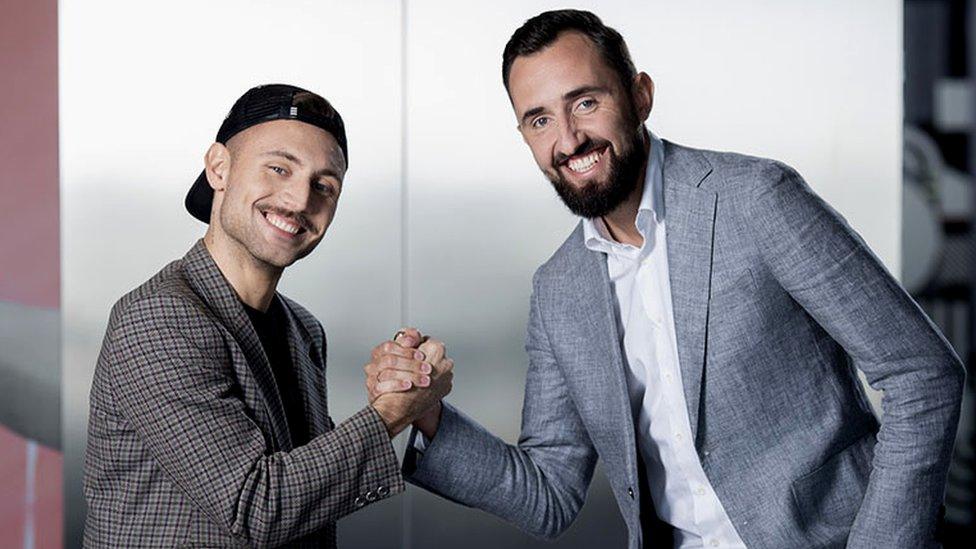
Daniel Di Giusto and Jacek Siadkowski are both working on the Tech To The Rescue project
Smaller firms
This rapid response has not been limited to the biggest companies: smaller firms are also pitching in. HerImpact, a recruitment agency in Warsaw, is working for free to help women arriving from Ukraine create new CVs, apply for jobs and translate documents into Polish and English, says chief brand officer Dionizy Wincenty Placzkowski.
"Many Poles have opened their hearts and houses to provide support to people in need," says Agata Zeman, managing director of the 24/7 media agency in Warsaw. The agency has donated part of its office to Flying Bag Foundation which is helping refugees, especially teenagers, organise their lives in Warsaw. "I am proud of our people, who from the first minute, were united in solidarity and support for Ukraine. Like many other firms, we have given our team time to volunteer."
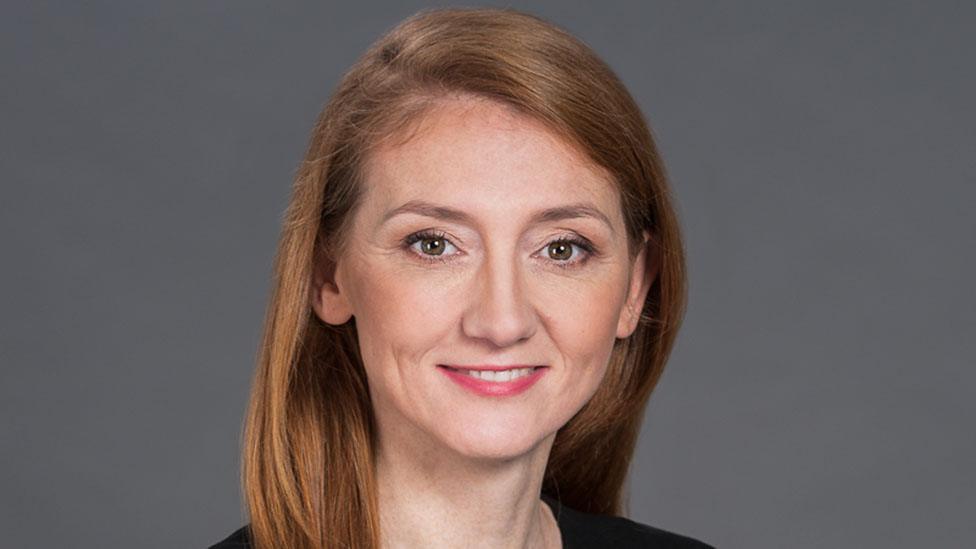
Agata Zeman, managing director of the 24/7 media agency in Warsaw says staff are volunteering their time to support new arrivals
A Polish foundation that connects IT companies with non-governmental organisations - TechForUkraine - was launched the day before Russia's invasion and within two weeks had 450 firms signed up and 30 projects launched.
"IT companies have these 'superpowers' and want to use them for good," says Jacek Siadkowski, director of TechForUkraine. "Young people coming into the sector in Poland often work on strategies for selling sausages or something, and this campaign really galvanised them."
Mr Siadkowski says TechForUkraine is working on an "Airbnb-style" web platform, to help Ukrainians find accommodation. He says the platform called, uaSOS.org, is being developed by BCG, ID Advisory, Clevsoft and several dozens volunteers pro bono.
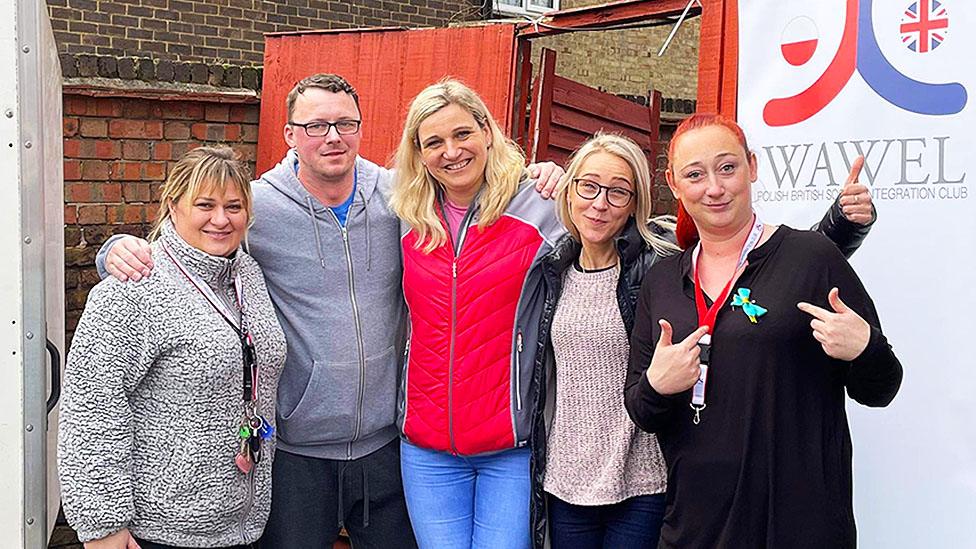
Polish British Social Integration Club, Wawel, a charity based in West London is sending out donations from the UK.
Ties between UK and Poland
Mr Dembicki says many of the BPCC's members - one third are large UK-based businesses investing in Poland - have pledged some kind of support, some financial. He says many of the UK's 52 chambers of commerce also want to help, offering English language lessons online.
"As soon as we heard about the war in Ukraine, I asked friends to start a collection of humanitarian aid, so together with Katarzyna Mazurkiewicz and volunteers we organised it," says Irina Nowosielska from the Polish British Social Integration Club, Wawel, a charity based in West London.
"There are a lot of good people around. It's just unbelievable how many people help us to help Ukraine," Ms Nowosielska says.
Back in Warsaw however, Olena Zlahodniuk, is already itching to go home. "I am extremely grateful to the Polish people for helping, but this is our fight and we will win," she says.

War in Ukraine: More coverage
